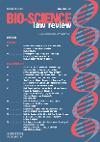Bio-Science Law Review - Volume 18 - Issue 2

ARTICLES
PATENT ENFORCEMENT IN THE CPTPP AND WHAT IT MEANS FOR THE UNITED KINGDOM
PAUL ENGLAND Taylor Wessing, London
The UK opened negotiations to join the Comprehensive and Progressive Trans-Pacific Partnership (CPTPP) on 22 June 2021. The effort to join the CPTPP heralds what the government hopes will be a shift towards the trans-Pacific region as the growth area of trade significance in the 21st-century world, as trade with the EU diminishes. The CPTPP agreement is between 11 countries with a joint GDP of £9 trillion in 2019. If the US joins it will become the largest trade bloc in the world. But how does this affect patents? This article outlines the key provisions on patent protection and enforcement of the CPTPP and examines the hurdles and opportunities that may be presented to the UK.
EU MERGER CONTROL: A NEW POLICY ENABLES POST-CLOSING REVIEWS OF DEALS
PAUL JOHNSON AND GAVIN BUSHELL
Baker McKenzie, Brussels
This article provides an overview of the Commission’s new merger control referral guidance (Article 22) and the implications it has on M&A transactions in the bioscience sector. It also provides practical guidance on how to manage this risk.
CASE COMMENTS
THE CAT’S LATEST PAROXETINE ‘PAY-FOR-DELAY’ JUDGMENT: MARKET DEFINITION CONFUSION
SOPHIE LAWRANCE AND SEAN-PAUL BRANKIN
Bristows, London
The CAT’s judgment in the Paroxetine case that upheld the EU approach to ‘pay-for-delay’ patent settlements adopted an unusual approach to market definition, which is the focus of this comment.
ASTRAZENECA ORDERED TO DELIVER VACCINES TO THE EU
TINE CARMELIET AND LORE VAN ESPEN
Allen & Overy (Belgium) LLP, Brussels
The Brussels Court of First Instance has ordered AstraZeneca to deliver 50 million does of Covid-19 vaccines to EU Member States.
‘COULD VERSUS WOULD’ APPROACH TO INVENTIVE STEP ASSESSMENT IN UK OSTOMY BAG PATENT PROCEEDINGS
SARAH TAYLOR AND BELINDA LAVIN
Pinsent Masons, London
The case of Coloplast A/S v Slats Healthcare Limited concerned a patent directed to part of an ostomy bag. The High Court considered the statutory approach to assessing obviousness in UK patent law, and confirmed that the question to be addressed is whether the claims involve an inventive step.
HIGH COURT CONFIRMS THAT AN ARTIFICIAL INTELLIGENCE CANNOT BE NAMED AS AN INVENTOR:
STEPHEN L THALER VTHE COMPTROLLER-GENERAL OF PATENTS, DESIGNS AND TRADEMARKS
PHIL MERCHANT
Boult Wade Tennant LLP, London
The High Court of England and Wales has upheld a decision by the United Kingdom Intellectual Property Office (UKIPO) to reject two patent applications in which an AI computer program was named as the inventor. The High Court concurred with the reasoning of the UKIPO in that only a natural person can be named as an inventor for a UK patent application.
NEW UK MHRA GUIDANCE EASES REGULATORY REQUIREMENTS FOR BIOSIMILARS
TRACEY ROBERTS
Pinsent Masons, London
The new MHRA guidance reflects the UK’s divergence from EMA regulation. It includes biosimilar marketing authorisations, requirements for clinical and non-clinical studies and the use of brand names for biosimilar products.
REGULATION OF GMOS: TIME TO MODIFY THE LAW?
RACHEL BRADLEY AND HANNAH FRICKER
Penningtons Manches Cooper, London
The authors consider the current laws governing the controversial area of genetically modified organisms (GMOs) in the UK and the EU, and observe the possibility of a changing landscape in the wake of Brexit. Indeed, there are mixed opinions as to the argument for removing simple gene-editing techniques from the scope of GMO regulation, some of which are explored here.
WILL THE REVIEW OF THE UK’S R&D TAX RELIEFS SYSTEM BE BENEFICIAL FOR THE LIFE SCIENCES SECTOR?
PENNY SIMMONS
Pinsent Masons, London
The recent consultation into the UK’s R&D tax relief system provides an opportunity for the UK Government to initiate improvements to encourage investment. However, achieving effective reform is a careful balancing act between ensuring changes improve efficiency whilst also maintaining accessibility to R&D intensive businesses, particularly those in the life sciences sector, often reliant on tax reliefs for survival.
TASK FORCE CONDUCTING PUBLIC REVIEW OF SCRUTINY OF PHARMACEUTICAL MERGERS
MICHELLE MANTINE, ISABELLE RAHMAN AND ROSS MACKENZIE
Reed Smith LLP, London
The Multilateral Pharmaceutical Merger Task Force is seeking to update its approach to analysing the competitive effects of mergers in the pharmaceutical sector, by means of a public consultation and subsequent review.
